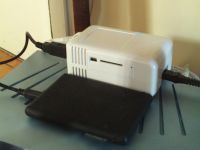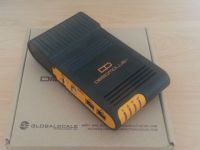Misadventures with Debian Wheezy installation on the DreamPlug
Written by Paul Kocialkowski no commentsAs I'm moving towards studying at the university, I got myself a flat, which makes it perfect for hosting another server, with better capacities and a better Internet connectivity. I was (and still will be for probably about a week) worried of losing mails due to an electric/internet/disk failure on my only server. Thanks to this new opportunity, I'll have good-enough redundancy to stop caring.
SheevaPlug

My current server is a SheevaPlug, which embeds the kirkwood platform -- not so powerful, but apparently just enough for my needs. The biggest drawback of this device is its lack of connectivity: only one ethernet (not that I really care for more, but it can come in handy), one USB2 port and one sdcard port. Its internal memory is 512Mib NAND and there is no WiFi/bluetooth/audio: just fine for a home server with an external USB disk, but cannot do much more. It is also known to have a PSU over-heating problem (or something of the same sort) that is supposed to make it unusable soon enough. I didn't encounter the issue so far and I've been using it for about 2 or 3 years now. What I'm more concerned about however is the health of the external USB disk. Not that I've seen I/O errors, but it sometimes (maybe once every 4 or 5 months) seems to disconnect, and I have to reboot the plug.
DreamPlug

So I decided to go with a DreamPlug for my new place: more connectivity (including e-SATA), more internal storage (on mmc instead of NAND) and a presumably safer PSU. Note that the UART/JTAG module is sold separately, while the SheevaPlug has it embedded. For more details and comparisons between the two devices, I'm maintaining the Plug Computers hardware resource page at LibrePlanet. The device ships with Debian pre-installed, but I prefer to reinstall a sane base and reflash the bootloader. Moreover, the DreamPlug (and the SheevaPlug as well) have full-blown Debian support, with bootable installer images.
Installing Debian Wheezy
Being very happy with the Debian support for both these devices, I started by installing Wheezy on the DreamPlug. Reflashing the bootloader went well: the pre-installed version was U-Boot 2011.06 (Oct 15 2011 - 02:02:08) and was upgraded to U-Boot 2012.04.01 (Jun 01 2012 - 02:17:08) which is the version in the wheezy u-boot package. Then I went on to booting the installer uImage and uInitrd (respectively the kernel and initramfs images in u-boot format) from TFTP: I used tftpd which uses the inetd superserver and can be configured from /etc/inetd.conf.
As the installation went through, it seemed like everything was going perfectly well, except that at some point, the whole thing simply hanged on Installed u-boot-tools. After some extensive research, it turned out that the problem was caused by the partition layout I chose: ext2 rootfs instead of ext4, which for some reason didn't call the script in charge of updating the /dev nodes after partitioning the disk. Hence, the nodes in /dev/disk/by-uuid/ were not updated and the flash-kernel script couldn't match the (correct) UUID from fstab. When that happens, the tool (in particular the part that generates the initramfs with the rootfs node) shows an error message and waits for input from stdin, which simply couldn't arrive in the installer context. The workaround I used was to run "udevadm trigger" on the installer shell, kill the script and start that last step again. Then it worked.
As reference, here is the thread on the debian-arm mailing list: Installing Wheezy on DreamPlug: Unable to make the system bootable. I also opened bugs at Debian: flash-kernel: flash_kernel_set_root waits for stdin in a particular case, which makes the installer hang and partman-base: /dev/disk links are not refreshed on dreamplug after repartitioning. Both are not solved yet as of today, but I hope the relevant developers will hop in to make that last remaining annoying bit go away!
Sidenotes
In the end, the only thing that still bothers me is the incredibly long boot time. It seems to be because the internal mmc is awfully slow: using an external usb disk reduces the boot time from more than a minute to roughly ten seconds.